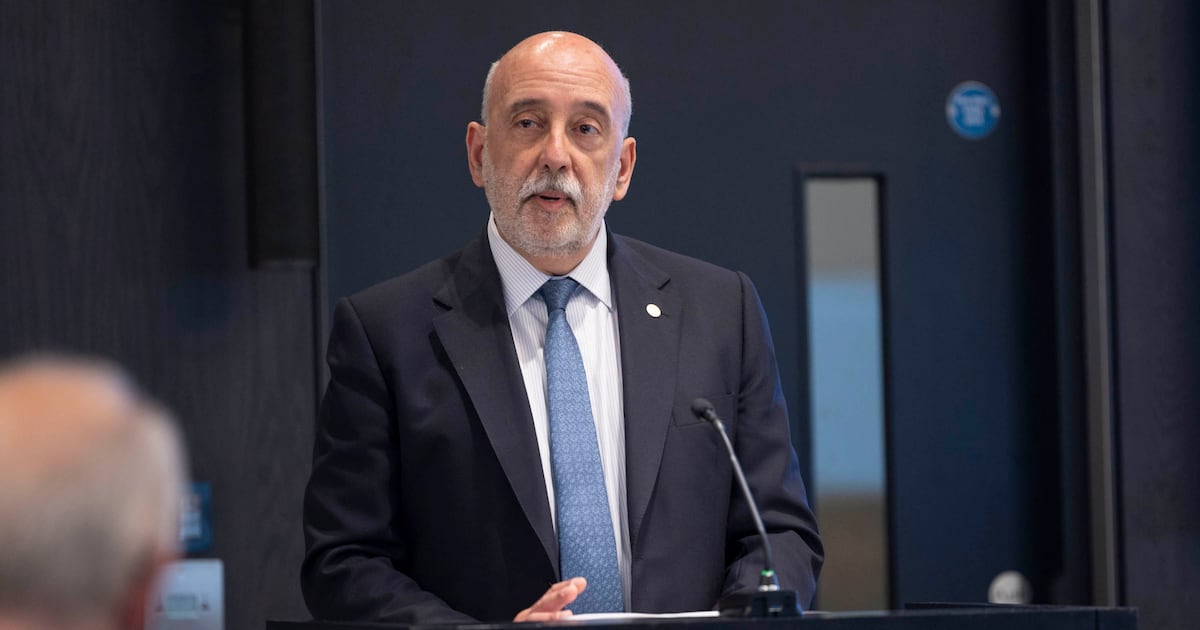“A lot of prudence” is needed in Budget 2026, while there is a case for postponing recurrent spending and tax cuts until there is “greater clarity” on the negative implications of the EU-US trade deal, a prominent economist has said.
Dan O’Brien, the chief economist of the Institute of International and European Affairs, made the remarks while responding to comments from the Central Bank governor Gabriel Makhlouf suggesting the Government should rethink its approach to the October budget.
In its summer economic statement last month the Government said a €9.4 billion tax and spending package will form the foundation of the upcoming budget.
However, the Coalition warned at the time it may have to “recalibrate” its strategy and reduce the size of the overall package if there is a “deterioration in the tariff landscape” over the coming months.
The European Union has since struck a trade deal with the United States which sees EU goods, including those from Ireland, hit with 15 per cent tariffs by the US.
The Business Post reported on Sunday that Mr Makhlouf said Minister for Finance Paschal Donohoe now has “more certainly” for planning the budget with the level of tariffs on EU goods known.
“Hopefully the summer economic statement is not the budget, and hopefully, by the time he (Mr Donohoe) gets there, he will have reflected again on what the trade situation is telling us,” Mr Makhlouf said.
He added: “For an economy operating at full employment, we’re adding more stimulus to the economy than it needs – and I would look again at what we’re planning to do.”
Mr Makhlouf also told the paper: “I think at the moment there’s a risk that we’re in the wrong place.”
[ What did the summer economic statement really tell us about Budget 2026?Opens in new window ]
A spokeswoman for Mr Donohoe declined to comment on Mr Makhlouf’s remarks.
During an interview on Newstalk radio on Sunday, Mr O’Brien was asked if he agrees Mr Donohoe needs to rethink the budget.
He said this suggestion is “largely” correct, as “we’re facing a lot of uncertainty”.
Mr O’Brien added: “I think the Government needs to manage expectations around this. There’s been a lot of giveaways [in recent budgets]. Clearly we had a general election last year.”
He said there has been a “big uptick in inflation” but this has “come right back down again” and “there isn’t the justification for Government to be intervening to deal with every problem”.
Mr O’Brien said the implications of the trade situation for the pharmaceutical sector are uncertain, relying on the “whims of the US president who may just decide he doesn’t like the pharmaceutical sector in Europe selling stuff to the US and he may do something more radical”.
He added: “So there’s a lot of uncertainty here, and I think we need a lot of prudence in this budget.”
Asked about potential tax choices in the budget, Mr O’Brien argued there is “no economic justification” for the Government’s intention to reduce the VAT rate for the hospitality sector.
“One might strongly make the case that both recurrent spending and tax cuts maybe need to be postponed until we get greater clarity as to the negative implications of the trade deal and the extent to which it effects particularly the pharmaceutical sector and how that feeds into corporation tax revenues,” Mr O’Brien added.
“We just don’t know how big a hit that could impose on the public finances if we get a change in pharmaceuticals sales to the US and that results in a reduction in corporation tax profits.”
 Did the EU have its hands tied before striking a trade deal with the US?
Did the EU have its hands tied before striking a trade deal with the US?

